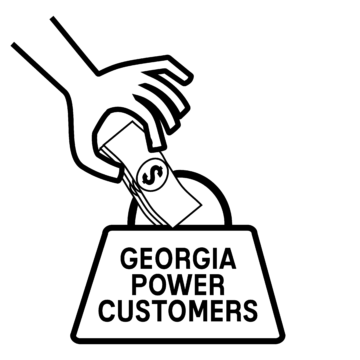 In June, Georgia Power submitted a proposal to charge its customers for an additional $2.2 billion. A very troubling part of Georgia Power’s proposal: they propose to nearly double the mandatory monthly fee (which is hidden on most bills), from the current $10/month to $17.95/month for residential customers.
In June, Georgia Power submitted a proposal to charge its customers for an additional $2.2 billion. A very troubling part of Georgia Power’s proposal: they propose to nearly double the mandatory monthly fee (which is hidden on most bills), from the current $10/month to $17.95/month for residential customers.
Customers must pay this fee no matter how much or how little energy is actually used, paying at least $215 per year before even flipping on a light switch. If approved, this would be among the highest mandatory monthly fees of investor-owned utilities around the country! Compared to other states in recent years, Georgia Power’s proposed fee of $17.95 is 78% higher than the average approved fee ($10.11) and their proposed increase of $7.95 per month is nearly 6 times greater than the average approved fee increase ($1.38).
TAKE ACTION AT NOFEEHIKE.COMRather than such an exorbitant fee hike, Georgia Power should continue to prioritize basing customers’ bills on how much energy you use–the less you use, the less you pay.
Why Do Mandatory Fees Hurt Customers?
1. Mandatory fees take away customer control – Normally, an electricity customer can control their bill by controlling how much power they use. If customers are smart and thrifty and use less energy, they are rewarded every month with a lower bill. A high mandatory fee throws this opportunity for cost savings out the window and severely limits a customer’s choice and freedom to control their energy costs and lower their energy bills. As stated in the AJC, as the fee hike takes away the ability to save, “setting the AC at 78 degrees could mean more sweat and less savings.”
2. Mandatory fees place the heaviest burden on seniors and working families who are earning lower incomes – The largest impacts will be felt by customers who are least able to afford the higher fees–those who use less energy than average or have below-average income. Seniors on fixed incomes and renters living in apartment buildings are low energy users, while working families are on tight monthly budgets. The average social security check in Georgia is only $1,382, which is already spread too thin between food, rent, transportation, medical bills, and prescription costs. Like these other necessities, electricity is not a luxury. Just as Georgia doesn’t tax for basic groceries, utility companies shouldn’t charge so much just for basic access.
3. Mandatory fees help utility shareholders and executives, not customers – Increasing customers’ fees this much puts profits over people–increasing revenue for the benefit of shareholders and executives, rather than helping customers. Georgia Power made more than $3.5 billion in profit over the last three years and paid their CEO millions of dollars per year, while customers are left facing even higher electric bills. With so much profit, and other, more equitable ways of raising revenue, the steep fee hike is unjustified.
4. Mandatory fees punish energy conservation and solar energy – High mandatory fees reduce the payback of investments customers have made in saving energy through energy efficiency measures like replacing light bulbs, insulating their homes, or installing solar panels. People who have done all the right things at their homes and businesses to save energy and produce clean energy will actually be punished, rather than rewarded. Customers will have less incentive to save energy and the environmental benefits of energy conservation will be reduced.
What Can You Do?
Georgia Power’s proposed fee hike can be defeated if we speak up loudly in opposition! The hike is not a done deal yet and cannot go into effect without first getting approval by our elected energy regulators, the Georgia Public Service Commission (PSC). So make sure that your voice is heard: contact the PSC and state legislators and ask them to stand up for us!
TAKE ACTION AT NOFEEHIKE.COMLEARN MORE HERE